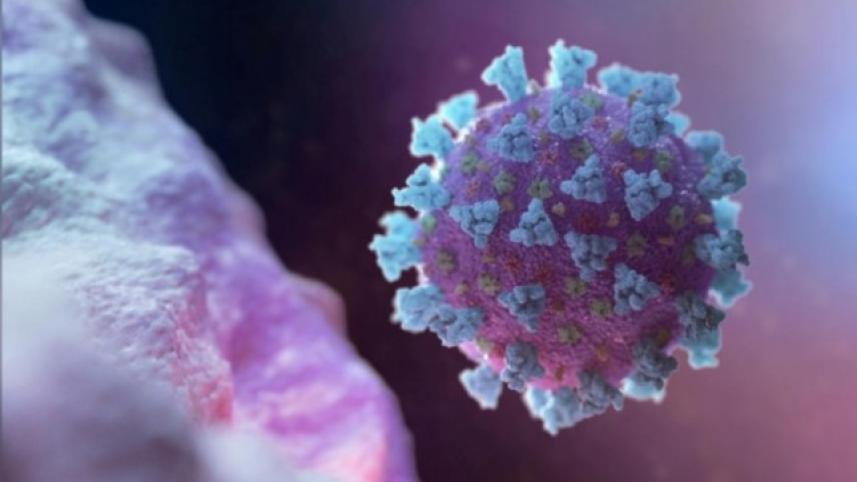Others too risking it all

While most expecting fathers dream of holding their child for the first time to feel the joy of holding his future in his arms, the reality was very different for one Shariful Islam.
A senior reporter of Jamuna Television, Shariful became the father of a baby girl on April 11.
However, he had to refrain from touching his baby when a nurse showed him his new born.
The journalist's job requires him to be outdoors in the time of the coronavirus outbreak. And so, to keep his baby safe, he instead took a photo in his mobile phone and saw his daughter by zooming into the picture.
"It's all for the safety of my baby girl. As I go outside every day and mix with people, I put all my emotions and feelings aside," he said.
Shariful is among several other professionals who are on the frontlines of the Covid-19 pandemic.
When social media is flooded with different types of rumours, mainstream newspapers, television channels and online news portals are coming up with authentic information, analyses, and suggestions for their readers and viewers to keep safe and stay healthy.
Many reporters, photographers and videographers, especially those working for news channels, have to visit hotspots exposing themselves to the coronavirus. Several TV reporters and staffers have already been infected with the coronavirus.
On the other hand, a huge number of law enforcers are deployed to ensure lockdown and convince people to stay home while maintaining physical distancing. On many occasions, police have to guard potential Covid-19 patients so that they cannot flee. They have also been arranging funerals for dead coronavirus patients.
Bankers are another group of professionals who are providing services to people by keeping financial transactions alive. In doing so, they have to deal with a huge number of customers daily, which can be a possible source of coronavirus infection.
Police too are risking their lives.
"We are working in a panicked situation. All [of my colleagues] are panicking now," said a sub-inspector (SI), preferring anonymity, of a police station in Dhaka.
"We have taken very little safety measures. Yet we have to deal all types of people and we don't know who is infected and who is not," he said.
Sharing his experience, the SI said three people in his police station have tested positive for Covid-19 and they had to be guarded so that they could not flee.
Law enforcers are also having to be stationed near hospitals.
"But, in the name PPE [personal protective equipment], what we have provided are actually raincoats. Besides, we had to buy gloves and hand sanitisers [on our own]," he said.
He has already sent his wife and two and a half-year–old child to their village home for their safety.
While their lives are at risk, their workloads have also increased, he said.
Amid the coronavirus outbreak, they had to increase check-posts and patrol in areas under their jurisdictions. "Apart from our normal work, we have to collect all corona-related information, market monitoring, ensure lockdown and convince people to stay home."
Many people, however, do not want to follow safety instructions, he added. "In the given situation, we are trying our best for the sake of the people and the country."
An employee of a private bank also shares a worrisome picture. Amid the shutdown, all private and public banks are operating at a limited scale.
The banker lives at Mayakanan area near the capital's Bashabo, one of the most Covid-19 affected areas. He has to go to his office in Motijheel on foot. His colleagues living in other parts of the city or in Narayanganj are facing bigger problems. They have to work each alternative week.
"Whenever, I come out of my home, I get frightened…We are living in constant fear. One fear that always come to mind id whether I have been infected when I was outside," he said, asking not be named.
As he works at the headquarters, he has to deal with a relatively high number of people. "But my colleagues working at branch offices are at a higher risk as they have to deal with a bigger number of people directly," he said.
Situations at public banks are even more dangerous, especially at the countryside, as those have very limited online transaction systems.
An official of Sonali Bank Limited in Faridpur said that although the government has set a limited time for bank transactions, the number of service-seekers remains the same. Besides, some of their colleagues do not come to office regularly as their homes are far away.
"In the given situation, we have to deal with almost the same number of customers in half the normal time with fewer staffers," he said.
Asked about customer safety, he said they deployed police so that customers maintain social distancing, but, on many occasions, service seekers do not bother.
About staff safety, the authorities concerned have given safety materials, which are inadequate, so they had to personally collect some, he said. "But when I go home, I feel insecure. I take a bath and wash all my clothes regularly to feel secure."





 For all latest news, follow The Daily Star's Google News channel.
For all latest news, follow The Daily Star's Google News channel.
Comments